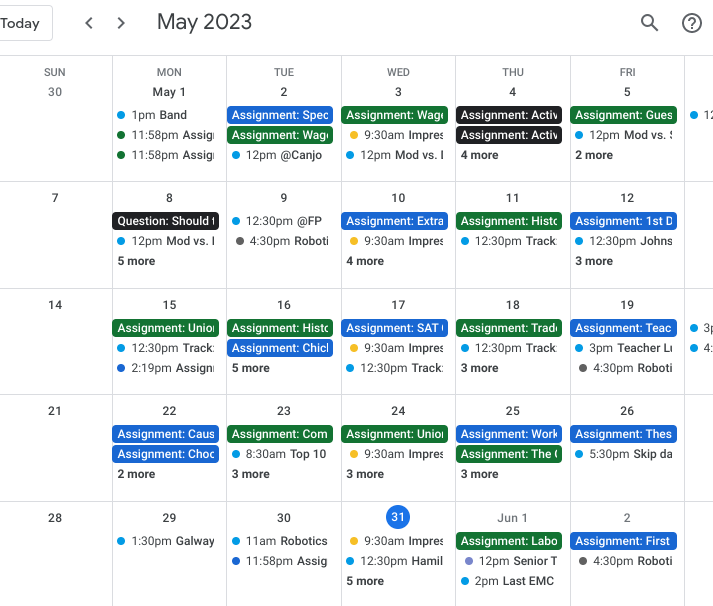Why do we procrastinate?
When tasked with beginning this paper, the first deadline was to have an outline completed by April 27, giving me a full week to work. I was unaware that the deadline was moved to May 2, but nonetheless I began the process of crafting an outline on the 26th, just 24 hours from when I thought the deadline was. Why would I do that? What possibly could have prompted my extremely last minute start? Before you begin to formulate opinions on my time management skills, work ethic, and character, I’d like you to think back on your own experiences. Surely there is at least one point in your life where you were supposed to do something, but instead waited until the last possible moment. According to the University of California Santa Cruz, 20% of adults procrastinate, and that number jumps to 70% when looking at college students (“Time Management and Procrastination”, 17) . Despite the fact that we know waiting only hurts us in the long run, we procrastinate anyway. We search for any cause to delay. Dr. Piers Steel, a professor of motivational psychology at the University of Calgary, considers procrastination a form of self harm (Lieberman, 4). We know the dangers and damages, yet we choose to make our own lives harder.
Time management and work ethic are the most popular scapegoats. Many people might consider myself and my fellow procrastinators lazy, or at the very least suffering from poor organization of our time. We are lectured by parents, teachers, and friends, told that we just need to work harder, sooner, and faster. We let ourselves use the excuse “I’m busy” to justify waiting. When there’s a lot going on, it’s easy to procrastinate on the long term projects. It seems like we must just have too much on our plates, and handle the tasks we have been assigned poorly. However, procrastination actually has nothing to do with time management or work ethic. Dr. Tim Pichyl offers the alternative view, stating, “Procrastination is an emotion regulation problem, not a time management problem” (Lieberman, 10). It’s not about time as a physical entity. No matter how much time we are given, whether it be rushed or way more time than necessary, people will find a way to procrastinate. It has nothing to do with how we manage our time, rather it has everything to do with how we manage our minds.
Negative emotions, like a fear of failing, related to a task can also lead to procrastination. If a job is unpleasant, or hard, we are more likely to wait to do it. Perfectionism is a commonly cited cause for delaying the start of work. As Dominic Voge of Princeton University says, procrastination acts as a “self-protection strategy.” Rather than trying, and risking failure, people opt to wait until trying their best is no longer possible. He explains, “if you procrastinate, then you always have the excuse of “not having enough” time in the event that you fail, so your sense of your ability is never threatened” (Voge, 3) They let a fear of failing derail their progress. If I never begin my outline, I won’t start my essay, and the day after the deadline, when I am rushing to ensure that I have a passable excuse for a paper, I can simply say “I didn’t have enough time” and never question my own ability if the paper I submit is subpar. While perfectionism is likely the cause of some procrastination, people procrastinate on many tasks, even ones that don’t involve a risk of failure. People don’t procrastinate on getting dressed for the day or brushing their teeth because they are scared they will do it wrong. What else could be causing them to wait?
To find the true cause of procrastination, we have to look deeper. In fact, we need to think of the issue as not related to time management, or visible emotions, but rather as a neurochemical cycle that plays on an evolutionary tendency to wait. Procrastination is just one effect of present bias, our tendency to focus on short term issues rather than long term problems (Lieberman, 19). This stems from the fact that in order to survive, we think about providing for ourselves here and now before we consider improving ourselves or our situation. Back in the days of hunting and gathering, we didn’t plan for the future. We had to focus all of our mental capacity on the current moment, lest we not find adequate food for survival. Dr. Hal Hershfield of UCLA has studied this phenomenon. His research has shown that when we procrastinate, we don’t think about it as hurting ourselves, but rather a stranger. That stranger is our future self (Lieberman, 20). Inside our heads, we consider the task someone else’s problem if we wait. We prioritize ourselves, focusing on our immediate needs, leaving that stranger to struggle with the consequences.
So, we all have a basic instinct to procrastinate. But we are conscious creatures, and have the ability to override our tendencies with logic. Why do we continue to wait even though we know it hurts us in the long run? This is because procrastination is a cycle. We procrastinate at some point because that’s how our brains are wired and then we do it over and over again because it is hard to stop once you start. On a neural level, our brain is always seeking a reward, a pleasant rush of chemicals. When you get away with procrastinating, there is often a rush of euphoria about beating the odds. Through this positive feedback loop, our brains begin to interpret procrastination as a good thing (Lieberman, 25). If it comes with that wonderful excitement from finishing just in time, why should you try to finish early? Over time, this becomes a habit, bordering on addiction, and you deceive yourself (Lieberman, 27). You begin to think that you just work better under pressure, which leads to you overestimating the time you have. If you can write an essay in three hours right before its due, the next time you are assigned an essay due in a week, are you going to start right away, or would you argue that you really only need three hours, so why not wait til you’re in the mood.
The neurochemical process may not seem like the most probable cause. It’s not something as apparent as time management, or extreme perfectionism. You might be thinking about how at the start of this essay, I stated that the vast majority of college students procrastinate, and the issue is still prevalent but less common in adults (“Time Management and Procrastination”, 17). This seems to suggest that we have simply learned better time management, and become more organized, making time management appear to be the most probable cause of procrastinating. Or maybe we eventually learn how to overcome perfectionism. However, this occurrence is more likely related to changes in our brains as we age. In a study on age-related changes in our brains, Thang Le, of Yale University School of Medicine, demonstrated that as we age, our motivation to seek rewards decreases (Le, 38). We become more dependent on logic and values, rather than what feels best in the moment. Think about the adults and college students you know. College-aged people are stereotypically focused at the moment.
There are many reasons why we procrastinate. We avoid a job because it is hard, unpleasant, or because we are scared that if we start now, we might fail, and we will be left with our own incompetence and no plausible excuses to shift the blame. Sometimes, the reason why we procrastinate is not visible on the surface at all. Yet we still put things off intentionally, knowing that we are only making our lives more challenging. Procrastination is not always a time management problem, or an emotional regulation problem, but instead, at the root of the problem, procrastination is a cycle fueled by a neurological tendency to wait. It is an addiction to the rush of euphoria when completing a task before the deadline when logic said you couldn’t.
Works Cited
Le, Thang M et al. “Age-Related Changes in the Neural Processes of Reward-Directed Action
and Inhibition of Action.” Frontiers in psychology vol. 11 1121. 10 Jun. 2020, doi:10.3389/fpsyg.2020.01121
Lieberman, Charlotte. “Why You Procrastinate (It Has Nothing to Do With Self-Control).” The
New York Times. 25 March 2019. https://www.nytimes.com/2019/03/25/smarter-living /why-you -procrastinate-it-has-nothing-to-do-with-self-control.html. Accessed 27 April 2023.
Pelc, Corrie. “Why do we procrastinate? Experts explain the science.” Medical News Today. 22
October 2022. https://www.medicalnewstoday.com/articles/why-do-we-procrastinate -experts -explain-the-science. Accessed 27 April 2023.
“Procrastination.” Psychology Today. https://www.psychologytoday.com/us/basics/
procrastination. Accessed 27 April 2023.
“Time Management and Procrastination.” University of California Santa Cruz. https://caps.ucsc.
edu/resources/time-management.html. Accessed 1 May 2023.
Voge, Dominic J. “Understanding and Overcoming Procrastination” The McGraw Center for
Teaching and Learning. Princeton University. https://mcgraw.princeton.edu/undergrad -uates/resources/resource-library/understanding-and-overcoming-procrastination. Accessed 27 April 2023.

Sara is a senior who has been writing for EMC for six years. She is involved in many clubs, including Robotics, Impressions, Science Club, NHS, and EMC....

